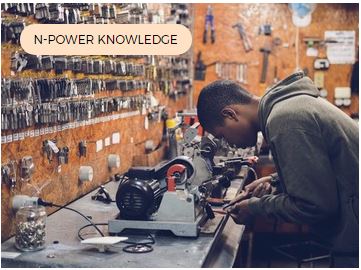When President Muhammadu Buhari in the democracy day celebration (when it was May 29) in 2016, announced the plan of his administration to empower millions of Nigerian youths through the N-Power, one of the components that were later made public was N-Power Knowledge.
And by June 12 the same year, the online application portal was made public for youth to apply online and a human resource and development expert Afolabi Imoukhuede was announced as the coordinator of the N-Power.
Other programmes under the youth empowerment included: N-Teach N-Agro, N-Health, and N-Tax, N-Power Community Education, N-Creative, N-Knowledge, N-Build, and N-Tech, and N-Software
Unfortunately, nothing was heard about the N-Knowledge through 2016 and 2017 (batch A and B), till the creation of the Ministry of Humanitarian Affairs, Disaster Management, and Social Development.
A few days ago, the Minister in charge of Humanitarian Affairs, Sadiya Umar Farouq, said that the abandoned component would commence in six geo-political zones of Nigeria and the Federal Capital Territory, Abuja.
10 Things to Know About N-Knowledge
You may be wondering what the component is about, here are the 10 things you need to know:
1) It is a programme designed by the NSIP office to train youths for outsourcing jobs within and outside Nigeria
2) Known as N-Knowledge for short, beneficiaries would be trained at eight innovation hubs spread across the country.
3) Beneficiaries would be provided with the necessary skills in the use of technologically-driven machines to help them cope with the competitive online workspace and digital job market
4) It’s only meant for young Nigerians between the ages of 18 and 35.
5) Upon the completion of their training, beneficiaries would be awarded certificate of training and attestation
6) A total of 20,000 young Nigerians would be selected
7) Successful beneficiaries would be provided with online platforms where they can get online tasks (job) and be paid for job done.
8) The training will specifically focus on developing competencies of the youth in software development and Hardware training
9) It’s to make the beneficiaries of the N-Power Knowledge competent in the Information Communication Technology (ICT) for them to be able to compete in the online job space in the areas of mobile apps and website development
10) Different schedules would be provided in accordance with trainees’ areas of interest.
The N-Power Knowledge component falls under the non-graduate, as such, they don’t have the same salary structure as N-Power graduate programme.
Recap:
There are millions of online job opportunities in the ICT space, the N-Knowledge is targeted at training 20,000 beneficiaries with the required tech skills for the digital job market
There will be centralized in-camp training for 3 months with a 6-month apprenticeship across Nigeria’s geo-political zones


